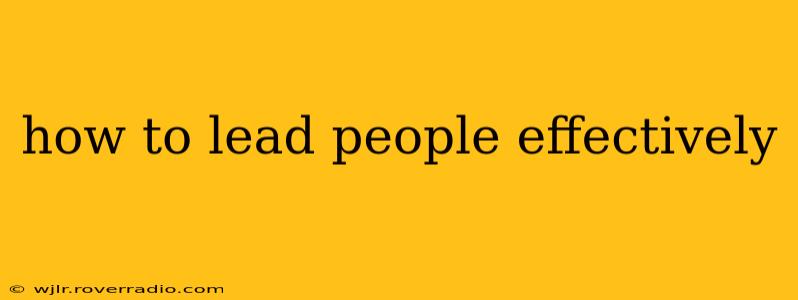Effective leadership isn't about wielding power; it's about inspiring and empowering others to achieve shared goals. Whether you're leading a team at work, managing a project, or guiding a group of volunteers, understanding the key principles of effective leadership is crucial for success. This guide will delve into the essential strategies and techniques to help you become a more effective leader.
What Makes a Leader Effective?
Effective leaders possess a blend of skills and qualities, adapting their approach to different situations and individuals. Some key traits include:
- Vision: A clear understanding of where the team or organization needs to go, and the ability to communicate that vision convincingly.
- Communication: Open, transparent, and empathetic communication is vital for building trust and ensuring everyone is on the same page.
- Empathy: Understanding and responding to the needs and feelings of team members fosters strong relationships and improves morale.
- Decisiveness: The ability to make timely and informed decisions, even in the face of uncertainty.
- Accountability: Taking responsibility for both successes and failures, and holding others accountable for their roles.
- Delegation: Assigning tasks effectively based on individuals' strengths and capabilities.
- Mentorship: Guiding and supporting the development of team members, helping them grow and reach their full potential.
- Adaptability: Flexibility and willingness to adjust strategies based on changing circumstances.
Understanding Your Team's Needs: The Foundation of Effective Leadership
Before diving into strategies, understanding your team is paramount. This involves:
- Individual Assessments: Recognize each team member's strengths, weaknesses, motivations, and communication styles.
- Team Dynamics: Analyze how team members interact, identify potential conflicts, and foster collaboration.
- Goal Alignment: Ensure everyone understands the team's goals and their individual contributions to achieving them.
Key Strategies for Effective Leadership
1. Setting Clear Expectations and Goals:
- SMART Goals: Use the SMART framework (Specific, Measurable, Achievable, Relevant, Time-bound) to define clear, achievable goals.
- Transparent Communication: Clearly communicate goals, expectations, and responsibilities to each team member.
- Regular Check-ins: Schedule regular meetings to monitor progress, address challenges, and provide support.
2. Fostering Open Communication and Collaboration:
- Active Listening: Pay close attention to what your team members have to say, both verbally and nonverbally.
- Two-Way Communication: Encourage open dialogue and feedback from your team.
- Team Building Activities: Organize activities that foster camaraderie and improve communication.
3. Empowering Your Team:
- Delegation: Assign tasks based on individual strengths and capabilities. Avoid micromanaging.
- Trust and Autonomy: Give team members the freedom to make decisions and take ownership of their work.
- Providing Resources: Ensure your team has the necessary tools, resources, and support to succeed.
4. Providing Constructive Feedback and Recognition:
- Regular Feedback: Provide regular feedback, both positive and constructive, to help team members improve.
- Specific and Actionable Feedback: Focus on specific behaviors and offer actionable suggestions for improvement.
- Recognition and Rewards: Acknowledge and celebrate accomplishments, both big and small.
5. Leading by Example:
- Integrity: Demonstrate honesty, ethics, and accountability in your actions.
- Work Ethic: Show your commitment to the team's goals through hard work and dedication.
- Positive Attitude: Maintain a positive and optimistic attitude, even during challenging times.
How to Handle Conflict Effectively
Conflict is inevitable in any team. Effective leaders know how to address conflict constructively:
- Listen Empathetically: Understand each person's perspective before attempting to resolve the issue.
- Facilitate Dialogue: Encourage open communication and collaboration to find a mutually acceptable solution.
- Mediate and Negotiate: Help team members find common ground and reach a compromise.
Developing Your Leadership Skills Continuously
Effective leadership is an ongoing journey. Continuously seek opportunities for professional development:
- Mentorship: Seek guidance from experienced leaders.
- Training and Workshops: Participate in leadership training programs.
- Self-Reflection: Regularly assess your own leadership style and identify areas for improvement.
By consistently applying these strategies and prioritizing continuous improvement, you can significantly enhance your ability to lead people effectively and build high-performing teams. Remember, effective leadership is a journey, not a destination.
